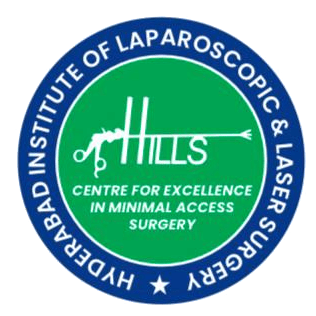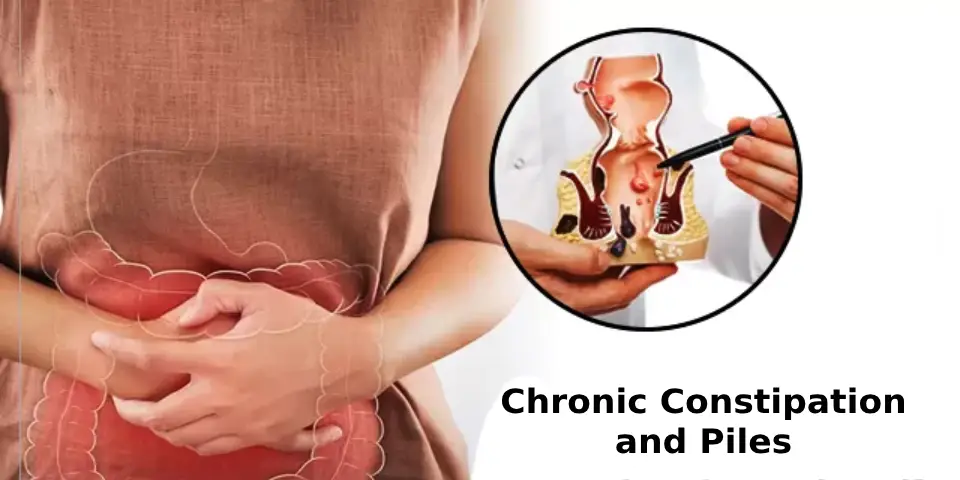Chronic constipation and piles (hemorrhoids) affect millions of Indians daily, causing discomfort, pain, and disruptions to work and personal life. These linked conditions often stem from poor bowel habits, low-fiber diets, or prolonged sitting. Straining during constipation increases rectal pressure, leading to swollen veins (piles) that may bleed or protrude. The good news? Simple changes like eating whole grains, vegetables, and lentils (25-30g fiber daily), drinking 8-10 glasses of water, and daily walks can soften stools and reduce straining. For those who still struggle, Dr. N. S. Babu, a top Surgical Gastroenterologist in Hyderabad, provides modern constipation treatment in Hyderabad, such as biofeedback therapy and painless laser surgery. With over 15 years of experience at Apollo Hospitals and EVOKE Clinics, Dr. N. S Babu ensures safe, long-term relief from chronic constipation and piles.
Understanding Chronic Constipation and Piles:
What is Chronic Constipation?
Chronic constipation refers to infrequent bowel movements (typically less than three times a week) that persist for several weeks or longer. It usually involves passing difficult, dry stools that may be painful or difficult to expel. Many patients struggle with symptoms like straining, a feeling of incomplete evacuation, or using manual maneuvers to facilitate bowel movements.
What are Piles (Hemorrhoids)?
Piles, medically known as hemorrhoids, are swollen blood vessels in and around the anus and lower rectum. They can be inner (inside the rectum) or external (under the skin around the anus). When internal hemorrhoids become enlarged, they may prolapse (protrude outside the anal opening) and cause significant discomfort.
The Connection Between Constipation and Piles:
Chronic constipation and piles often occur together because straining during bowel movements increases pressure on the veins in the rectum. This stress can lead to the development or worsening of hemorrhoids. Breaking this cycle is necessary for effective management of both conditions.
Dietary Strategies for Improving Bowel Regularity:
How Can Fiber Help with Constipation and Piles?
Increasing dietary fiber is the cornerstone of managing both constipation and hemorrhoids. Fiber adds bulk to stool and helps it retain fluids, making it softer and easier to pass. The Dietary Guidelines recommend 25 to 34 grams of fiber daily.
Best Sources of Natural Fiber:
- Whole grains like wheat, jowar, and ragi
- Legumes such as rajma, chana, and moong dal
- Fresh fruits with edible peels
- Leafy vegetables and other vegetables
- Nuts and seeds
A systematic review confirmed that fiber supplements moderately improve overall symptoms and bleeding from hemorrhoids and should be recommended at an early stage of treatment.
Why is Adequate Hydration Important?
Drinking sufficient water (8-10 glasses daily) keeps stools soft by ensuring proper hydration. This is especially important when increasing dietary fiber intake to prevent bloating and gas that can occur with sudden fiber increases.
Lifestyle Modifications for Bowel Health:
How Can Regular Physical Activity Help?
Regular exercise improves intestinal muscle tone and stimulates gut motility, which helps move stool through the colon. Even simple activities like a 30-minute daily walk can significantly improve constipation symptoms.
What Are Good Toilet Habits?
Establishing a regular bathroom routine is crucial for bowel regularity. Try to visit the toilet 15 to 45 minutes after meals when the gastrocolic reflex is strongest. Never ignore the urge to pass stool, as this can lead to harder stools over time. Also, avoid straining and prolonged sitting on the toilet, as these habits can worsen hemorrhoids.
Medical Management of Chronic Constipation:
When Should You Consider Laxatives?
When dietary and lifestyle changes aren’t enough, various laxatives may help manage constipation. The latest clinical guidelines recommend a step-wise approach:
First Line:
- Bulk-forming laxatives like ispaghula husk (1 sachet twice daily)
Second Line:
- Osmotic laxatives such as polyethylene glycol (Macrogols like Movicol, 1-3 sachets daily)
- Stimulant laxatives like senna (2-4 tablets at night) or bisacodyl (5-10mg at night), particularly when stools are soft but difficult to pass
Recent guidelines from the American College of Gastroenterology (ACG) and American Gastroenterological Association (AGA) have also recommended magnesium oxide and senna as evidence-based treatments for chronic constipation.
Treatment Options for Piles:
What Conservative Treatments Work for Piles?
Most patients with piles can be treated in primary care settings with:
- Dietary advice (high fiber)
- Improved anal hygiene
- Sitz baths for symptom relief
- Topical preparations containing local anesthetics or mild astringents (for short-term use)
When Is Medical Intervention Needed for Piles?
When conservative treatments fail, several office-based procedures may help, including:
- Rubber band ligation for internal hemorrhoids
- Sclerotherapy
- Infrared coagulation
For advanced cases, minimally invasive procedures like Doppler-guided hemorrhoidal artery ligation are available, which are relatively painless with minimal recovery time.
When to Consult a Surgical Gastroenterologist in Hyderabad?
Seek professional medical advice if you experience:
- Persistent constipation despite lifestyle changes
- Rectal bleeding
- Severe pain during bowel movements
- Grade III or IV hemorrhoids with significant prolapse
Dr. N. S. Babu, a renowned Surgical Gastroenterologist in Hyderabad, specializes in advanced treatments for chronic constipation and piles. With expertise in laparoscopic surgery and other minimally invasive techniques, Dr. Babu provides comprehensive care at EVOKE Clinics, Secunderabad, and Apollo Hospitals, Hyderabad.
Conclusion:
Chronic constipation and piles are manageable conditions with proper dietary, lifestyle, and medical interventions. Start with increasing fiber intake, staying hydrated, and maintaining regular physical activity. If symptoms persist, consult a Gastroenterologist in Hyderabad for specialized care and treatment options.
For piles treatment in Hyderabad or constipation treatment in Hyderabad, Dr. N. S. Babu offers evidence-based approaches tailored to individual needs. As an experienced piles surgeon and laparoscopic surgeon in Hyderabad, he ensures the most effective and least invasive treatment modalities for optimal patient outcomes. For expert care in constipation and piles surgery in Hyderabad, book your appointment with Dr. N. S. Babu today.

